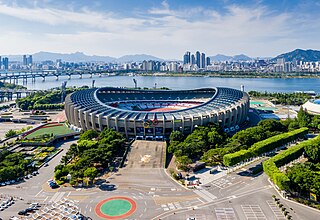Related Research Articles

The South Korea national football team represents South Korea in men's international football and is governed by the Korea Football Association. South Korea has emerged as a major football power in Asia since the 1980s, having participated in ten consecutive and eleven overall FIFA World Cup tournaments, the most for any Asian country. Despite initially going through five World Cup tournaments without winning a match, South Korea became the first Asian team to reach the semi-finals when they co-hosted the 2002 tournament with Japan. South Korea also won two AFC Asian Cup titles, and finished as runners-up on four occasions. Furthermore, the team won three gold medals and three silver medals at the senior Asian Games.

The Korea Football Association is the governing body of football and futsal within South Korea. It sanctions professional, semi-professional and amateur football in South Korea. Founded in 1933, the governing body became affiliated with FIFA twenty years later in 1948, and the Asian Football Confederation in 1954.

FC Seoul is a South Korean professional football club based in Seoul that competes in the K League 1, the top flight of South Korean football. The club is owned by GS Sports, a subsidiary of GS Group. Since 2004, FC Seoul have played its home games at the Seoul World Cup Stadium in Seoul's Mapo District.

The Korea Cup, formerly the Korean FA Cup, is a national football cup knockout competition of South Korea, held annually by the Korea Football Association (KFA). Before the competition was established in 1996, two similar tournaments named All Joseon Football Tournament (1921–1940) and Korean National Football Championship (1946–2000) were played. It was renamed Korea Cup in 2024, with the winners qualifying for the AFC Champions League Elite or the AFC Champions League Two.

The Seoul Olympic Stadium, a.k.a “Jamsil Olympic Stadium", is a multi-purpose stadium in Seoul, South Korea. It is the main stadium built for the 1988 Summer Olympics and the 10th Asian Games in 1986. It is the centrepiece of the Seoul Sports Complex in the Songpa District, in the southeast of the city south of the Han River. It is the largest stadium in South Korea.

Park Chu-young is a South Korean footballer who plays for Ulsan HD as a forward.

April 25 Sports Club, shortly 4.25 SC, also known as April 25 National Defence Sports Club, is a professional multi-sports club based in Pyongyang, North Korea, primarily known for its men's and women's football teams. The club belongs to the Ministry of People's Armed Forces; all members of the professional teams are considered officers of the Army.
Kim Yong-sik was a South Korean football player and manager. He is esteemed as the godfather of the South Korean football.
Football is one of the most popular sports, both in terms of participants and spectators, in Seoul. It hosted several of South Korea's leading football clubs and has the biggest football stadium in the country, the Seoul World Cup Stadium.
Kyungsung Football Club was the Korean football club based in the city of Seoul. The term Kyungsung (Keijō) was used instead of Seoul during the period of Japanese rule. After independence from Japan, the club revived and changed the name to Seoul FC in 1946. Due to the North Korean invasion, the club stopped operating.
This article documents the history of FC Seoul, a Korean association football club based in Seoul. For a general overview of the club, see FC Seoul.
The K League decentralization policy in 1995 was a policy of moving K League clubs located in Seoul to other regions. It was an effort by the Government of South Korea and the K League Federation to increase popularity of football nationwide before the 2002 FIFA World Cup for which they bid. In accordance with it, the three K League clubs, Yukong Elephants, Ilhwa Chunma and LG Cheetahs, moved from Seoul to Bucheon, Cheonan and Anyang, respectively, in 1996.
The Korean National Semi-professional Football League was contested between South Korean works teams and military teams from 1964 to 2002. It was the predecessor of the Korea National League which was founded in 2003.
The Kyungsung FC–Pyongyang FC rivalry, commonly known as the Kyung-Pyong Football Series, was a football rivalry in the early 20th century between Seoul and Pyongyang which are currently capital of South Korea and North Korea. The clash between Korea's two biggest cities was considered as the biggest rivalry in Korea. Seoul and Pyongyang developed historical rivalry for over a century, and their football teams were no exception.
Pyongyang Football Club was a Korean football club based in the city of Pyongyang, which is now the capital of North Korea. The club won the national cup competition in 1934.
Lee Young-min was a South Korean versatile sportsman who played in football, baseball and athletics.
K League (Korean: K리그) is South Korea's professional football league. It includes the first division K League 1 and the second division K League 2.

Ju Se-jong is a South Korean football player who plays as a midfielder for K League 2 club Daejeon Hana Citizen.
The All Joseon Football Tournament was the first Korean national football competition, held annually by the Joseon Sports Council or Joseon Football Association. The tournament of the Joseon Sports Council, officially recognized as a predecessor of current Korean FA Cup, was founded in 1921 and was annually held in Keijō with four divisions according to age. The Pyongyang YMCA and Kwanso Sports Council also annually held a tournament with the same name for the same period (1921–1942) in Pyongyang, but the popularly known competition is Gyeongseong's tournament.
References
- ↑ 한국인이 좋아하는 40가지 [문화편] - 취미/운동/애창곡/영화/반려동물 (2004-2019) (in Korean). Gallup. 25 May 2019. Retrieved 19 May 2021.
- ↑ "한국민속대백과사전".
- ↑ "KFA's summarized history of South Korean football". KFA. Archived from the original on 15 September 2012.
- 1 2 Trevena, Mark. "The British Influence On Korean Football". ROKfootball. Archived from the original on 17 July 2009.